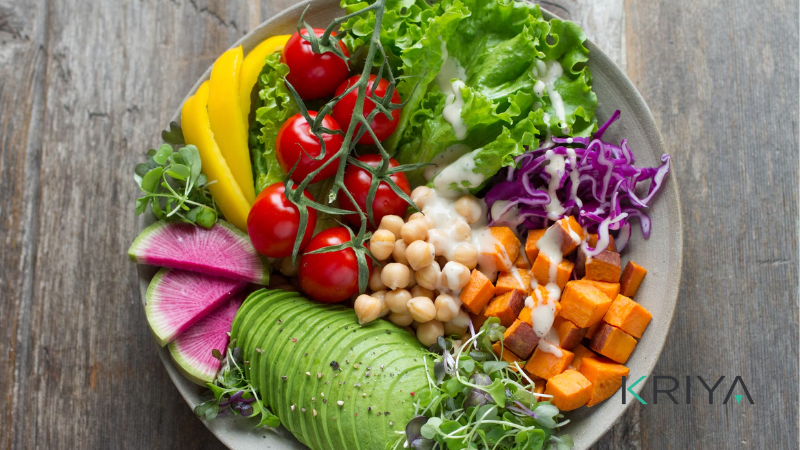
What To Eat To Help Boost Immunity In Body?
Four Yogic Seeds That Help Boost Immunity in the Body
For a yogi intake of food is as important as doing yoga. Doing Yoga and eating what you like is not adjustable to the body. You have to take a proper yogic diet to boost your immunity, and strength, relieve stress, and be healthy.
In the current time of pandemics, it is more important to take care of what you are eating and be physically and mentally active to boost immunity in your body. First, let’s look at what should you not eat to lose your immunity.
What Food & Drinks To Avoid Eating?

1. Alcohol
Alcohol leads to weakened immunity. Right now it is good to keep your body hydrated and thus one must avoid drinking alcohol as it can lead to dehydration. According to a study published in the journal Alcohol Research, alcohol consumption has also been linked with weakened immunity. At a time like this, staying well hydrated is the key to good health and you can drink water, coconut water, soups, and other healthy drinks.
2. Junk Foods
According to the department of health Australia, Junk food is used to describe food and drinks low in nutrients (e.g. vitamins, minerals, and fiber) and high in kilojoules, saturated fat, added sugar, and/or added salt. They are also known as discretionary choices. Eating junk food regularly can lead to an increased risk of obesity and chronic diseases like cardiovascular disease, type 2 diabetes, non-alcoholic fatty liver disease, and some cancers.
3. Processed Foods
As per a study published in the British Journal of Nutrition, healthy eating habits are vital to ensure a healthy body during this pandemic. Processed foods are rich in sodium. Therefore avoid such foods like processed meats, sauces, and other such products. Note that too much sodium is bad for you, and disrupts intra- and intercellular fluid levels.
4. Avoid Raw Meat
Raw meat or raw eggs are bad for your health. This includes Oysters as well. Even though oysters are bivalve filter feeders that munch on ocean sediment, people seem to love eating them raw. However, oysters are filled with bacteria and viruses. In most people, these pathogens can result in vomiting, diarrhea, and abdominal cramps that may last a few days. But in some, including those with liver disease, diabetes, or compromised immune systems, the Vibrio vulnificus bacteria found in oysters can lead to sepsis, shock, and death.
Also research found that cooking oysters or any meat does not necessarily kill all the bacteria and viruses that they contain. Switching to vegetarian or Vegan diet can help the body a lot to stay fit.
5. Sugar Beverages
Sugar-sweetened fruit juices or any such drinks are harmful to your body. In a 2019 cohort study of 13,440 adults, intake of each additional 12-ounce serving per day of sugary beverages was linked to an 11% higher all-cause mortality risk. In addition, intake of each additional 12-ounce serving per day was linked to a 24% heightened risk of all-cause mortality. It’s best to take fresh juice which you can take out from the fruits at home.
Now coming back to the topic, what we should eat.
Higher Protein, Low GI Diet
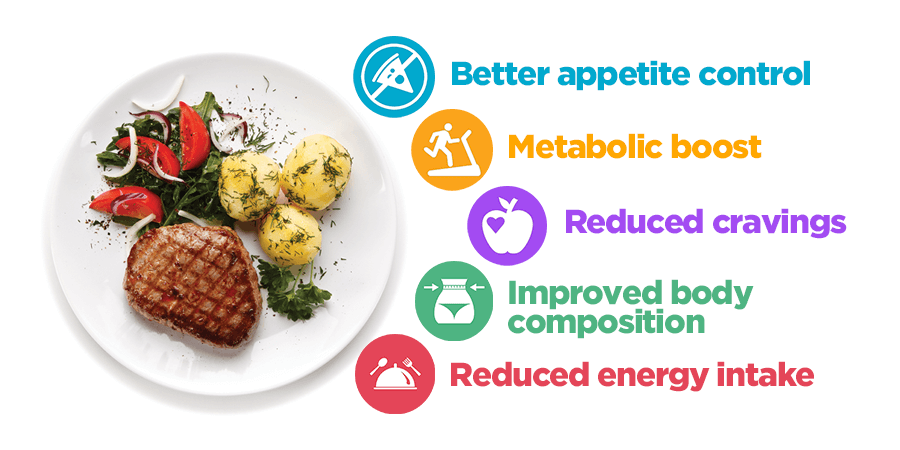
Higher protein and low GI diets like the CSIRO Total Wellbeing Diet are formulated to lose weight and improve gut health.
The CSIRO Total Wellbeing Diet is a 12 weeks program tailored to your personality with a higher protein, low GI meals which keep you feeling full for longer and gives you sustained energy.
The Sattvic Diet

The Sattvic Diet is what yogis eat and recommend to others to boost immunity in your body. The sattvic diet is a diet based on foods that contain one of the three yogic qualities (guna) known as sattva. In this system of dietary classification, foods that decrease the energy of the body are considered tamasic, while those that increase the energy of the body are considered rajasic.
A sattvic diet shares the qualities of sattva, some of which include “pure and natural food”. A sattvic diet can also exemplify Ahimsa, the principle of not causing harm to other living beings. This is one reason yogis often follow a vegetarian diet.
A sattvic diet to boost immunity in your body is a regimen that emphasizes seasonal foods, fruits if one has no sugar problems, nuts, seeds, oils, ripe vegetables, legumes, whole grains, and non-meat-based proteins. Dairy products are recommended when the cow is fed and milked appropriately.
What Does Sattvic Diet Include?
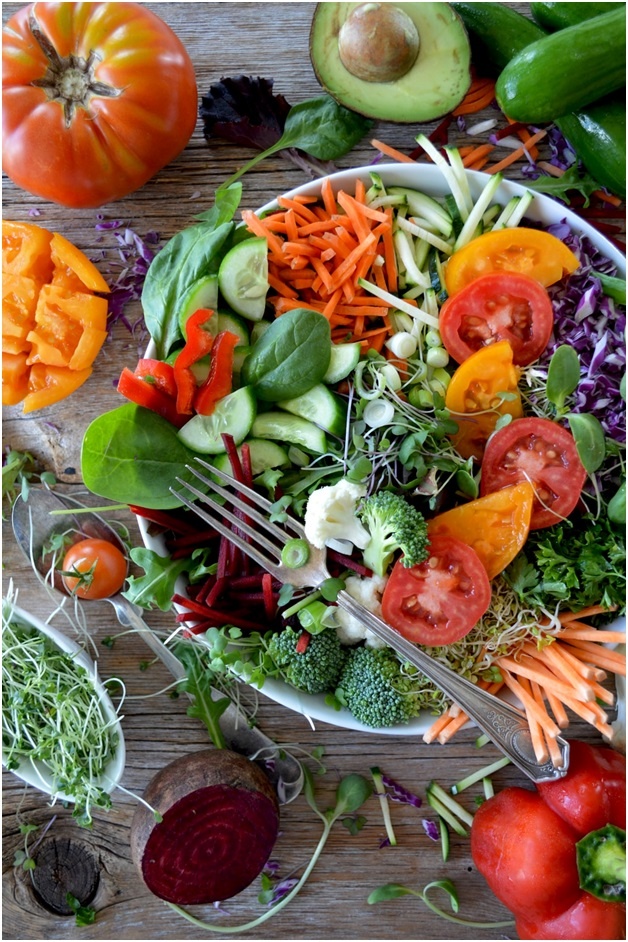
Sattivic diet includes:
- Nuts, seeds, and oils: Fresh nuts and seeds include almonds, hemp seeds, coconuts, pine nuts, walnuts, sesame seeds, pumpkin seeds, and flax seeds. Some of the best choices for oil are olive oil, sesame oil, and flax oil.
- Fruit: Fruits are an important part of the sattvic diet and all fruits are sattvic. So you can eat any fruit that you love to eat. Fruits should be thoroughly washed and then eaten.
- Milk Products: Milk, curd, yogurt and cheese are also considered sattvic conditioned that they are obtained from a happy and well fed animal. Processed cheese to be avoided and milk should always be boiled before intake.
- Vegetables: Green veggies are all sattvic where as pungent ones are avoided. Pungent veggies include hot peppers, garlic, and onion. Some even avoid mushrooms which is a gas-forming food. Sweet Potatoes are considered highly sattvic. A practice is to drink freshly made vegetable juices as well.
- Whole grains: Whole grains provide complete nourishment to the body. This include rice, whole wheat, oatmeal and barley. Yeasted breads are not recommended unless toasted. Wheat and other grains can be sprouted before cooking as well.
- Legumes: Legumes include lentils, yellow split peas, chickpeas, beans, are considered sattvic if well prepared. In general, the smaller the bean, the easier to digest. Legumes combined with whole grains can offer a complete protein source. Some yogis consider the mung bean to be the only sattvic legume.
- Honey and Jaggery: Most yogis use raw honey, jaggery, and coconut palm sugar as sweeteners.
Besides these there are other various spices and herbs that are included in a yogic diet.
Four Yogic Seeds That Help Boost Immunity in the Body
1. Fox Nut
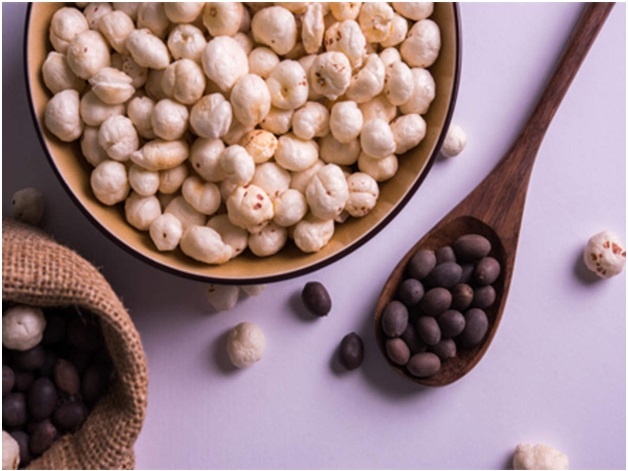
Fox Nut are lotus seeds and come from a plant called Euryale Fox which grows in the stagnant water of wetlands or ponds in Eastern Asia. They have been used in Chinese medicine since 3000 years and find an important place in the science of Ayurveda too.
Benefits include:
- They are low in cholesterol fat and sodium.
- Good source of calcium, consuming fox nut can play an important role in strengthening one’s bones.
- They are beneficial to those suffering from high blood pressure, heart diseases and obesity due to their high magnesium and low sodium content.
- Fox nuts are recommended for diabetics too due to their low glycemic index.
- It is an anti-ageing enzyme in these seeds is said to help repair damaged proteins.
- In addition, the presence of a natural flavonoid called kaempferol (also present in coffee), helps prevent inflammation and ageing.
- Ayurvedic beliefs suggest that fox nuts astringent properties that benefit the kidneys. These nuts are are gluten-free, protein rich and high in carbohydrates. They are low in calories, making them an ideal snack for weight loss.
How to eat: Roast and eat or grind them after roast and add 1 tsp in a glass of milk or curd.
2. Sesame seeds
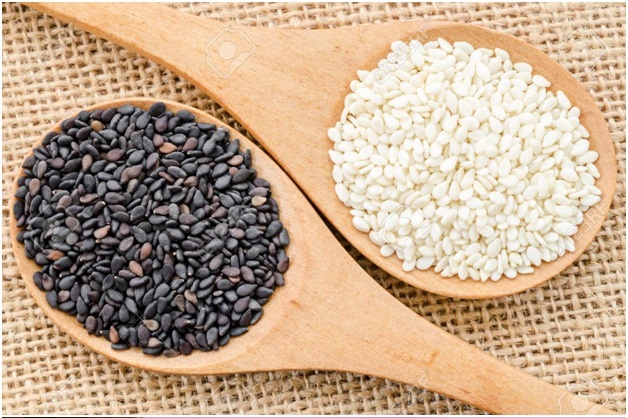
Sesame seeds have been in cultivation for thousands of years and are perhaps the oldest oil-rich seeds. The seeds are strongly endorsed by Ayurveda and other traditional forms of medicine for stimulating body heat, and energy and for skin, hair benefits, and more. Grown in the pods of Sesamum indicum (botanical name), a flowering plant mostly found in the tropical regions of India, South America, and Africa, sesame is a cash-rich crop that can withstand severe drought conditions.
Benefits Include
- These are tiny, nutty-flavored seeds and are used in various holistic and alternative medicines for their therapeutic properties. These seeds can fight against health conditions related or factors that can induce metabolic disorders and inflammatory and infectious diseases.
- Only a spoonful of sesame in your daily diet for its antimicrobial, antioxidant, anti-inflammatory, anti-diabetic, anti-cancerous properties, among others.
- It protects your liver health, serves as a gastroprotective factor besides restoring hormonal balance in women.
- Sesame seeds are a powerhouse of protein for building muscle mass, oil, mineral ash, fiber, soluble carbohydrates, phytate, a host of B vitamins and dietary minerals like magnesium, iron, calcium, zinc and phosphorous.
How to eat: Roast the seeds and add as seasoning various foods and salads. Roast and grind and consume 1 tsp powder in milk or curd.
3. Fennel Seeds
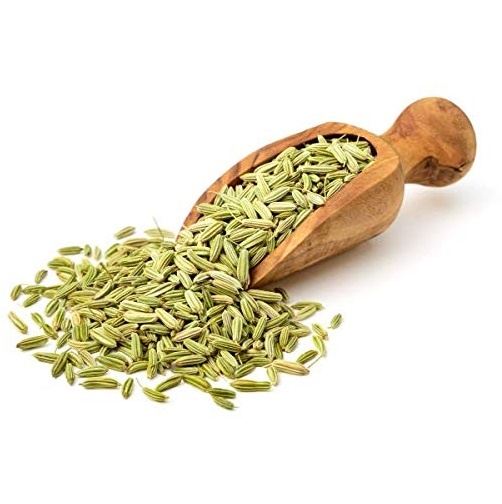
Fennel seeds are a flowering plant belonging to the Foeniculum Vulgare family, which is the same species as the carrot, caraway, dill cumin and parsley family. This flavoursome herb is the dried seeds of the fennel plant which is white and green with feathery leaves bearing yellow flowers. It is an indigenous plant in the Mediterranean region and is also widely cultivated across the world near the coastal and riverbank regions. Fennel plant has a mild, liquorice-like flavour, a sweet and woody taste, the distinct flavour is due to the goodness of potent essential oils.
Benefits Include:
- Fennel seeds are mainly rich in Vitamin C, Vitamin E, Vitamin K, Magnesium, Zinc, Potassium, Selenium, and Iron. These seeds have antibacterial properties, antifungal qualities, and anti-inflammatory properties
- This may help get rid of bacteria that can cause gassiness in cases of food poisoning or an upset stomach.
How to eat: You can crush and grind the whole seeds and add them as seasoning. Grind the roasted seeds and add a spoon to milk to relieve constipation.
4. Almonds

Almonds are the edible seeds of Prunus dulcis, more commonly called the almond tree. They are native to the Middle East, but the US is now the world’s largest producer. You can buy almonds in stores usually have the shell removed, revealing the edible nut inside. They are sold either raw or roasted. They are also used to produce almond milk, oil, butter, flour or paste — also known as marzipan.
Benefits Include:
- Almonds are a fantastic source of antioxidants. Antioxidants help protect against oxidative stress, which can damage molecules in your cells and contribute to inflammation, aging, and diseases like cancer.
- Almonds reduce blood sugar, healthy for heart, high in Vitamin E, are a good source of copper, vitamin B12 and phosphorus.
How to eat: A handful of Almonds can be soaked overnight and peeled in the morning to consume. Also, garnish your dishes with Almond seeds. Again like any other seeds make a fine powder of almonds and add 1 tsp of milk as well.
All the above seeds are high nutritious and best to boost immunity in your body.
Finally, remember that you need to eat everything in moderation. Too much of anything is bad for your health so keep that in mind. Besides eating doing daily yoga is also a must to keep you fit and healthy. You should realize whatever you put inside your body so will it become. Stay healthy, Be positive and stay safe!
